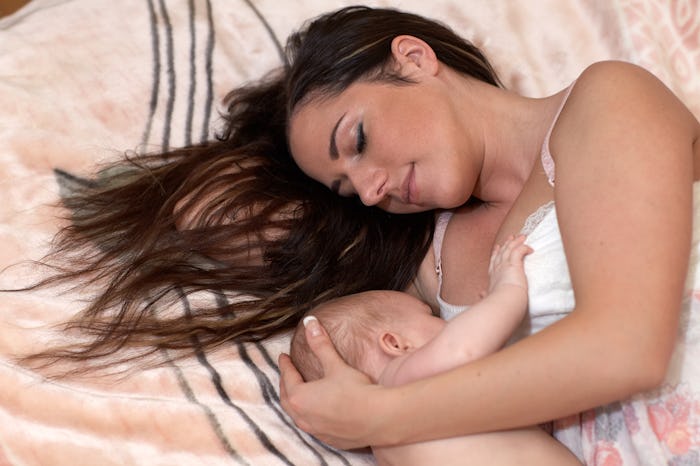Breastsleeping seems pretty perfect. Experts say the combination of breastfeeding and co-sleeping is not only safe for your baby, but will also give you more sleep and help bring you closer to your baby. But what does breastsleeping do to your body? Co-sleeping and breastfeeding both affect your body in different ways, but does breastsleeping?
In a way, yes. Although breastsleeping may not cause any physical changes that you're actually aware of, it does do a few things to your body. Dr. Cecilia Tomori, anthropologist with postdoctoral training in public health, Research Associate at the Johns Hopkins Bloomberg School of Public Health, and author of Nighttime Breastfeeding: An American Cultural Dilemma is an expert on breastsleeping and tells Romper that there is a physiological coordination that happens to mothers who are breastsleeping.
Breastfeeding mothers are physiologically attuned to their babies. Breastfeeding is part of complex, physiological coordination between mothers and babies that includes touch, breathing, temperature regulation, heart rate, sleep cycles, and a whole host of processes that are taking place at the same time.
She also notes that this physiological connection is part of the reason why many believe breastsleeping is safer for babies. Your body basically becomes part of your child's survival.
In fact, in the past, breastsleeping has been a way to help infants survive. Tomori says the proximity of breastfeeding mothers sleeping with their babies played a key role in enabling human infants, who lack the capacity to fully regulate their bodies, to survive. "Does this mean that this system ensures that mothers are always able to spot when something is wrong? No, it does not," she says. "But it is quite a robust system. In fact, breastfeeding and sleeping next to babies remains very common cross-culturally and in many groups in the U.S. as well, and was the historical norm for most people around the world."
According to the Mother-Baby Behavioral Sleep Laboratory at University of Notre Dame, only 25 percent of a baby's brain is developed when they are born. Being in close contact with a caregiver, specifically their mother's body, is what helps them continue to develop. And breastsleeping? It can turn your body into that regulator for your little one's physiological needs.
Another interesting note about breastsleeping? It puts your body into its own specific position. Tomori says that the act of breastsleeping is instinctive and so is the way your body and arms position themselves while it's happening. She says:
Breastfeeding moms are attuned to their babies in specific physiological ways and they usually place their babies under their arms (their arms blocking the pillow above), with the baby facing the breast, and their bodies curved around them, creating a safe space for the baby. In fact, they spontaneously adopt this posture without ever being told to do so, which likely reflects another evolutionary adaptation.
So if you're a stomach sleeper, you can expect breastsleeping to do a number on your body by totally changing your sleeping position in order to accommodate your little one's needs. It keeps them safe, it keeps them close to the breast, and it keeps you more aware and alert, even while you're sleeping.
Your body goes through some intense changes as a mom. And the changes that happen when breastsleeping may be the most subtle — but most fascinating — of them all. To have your body become your baby's own regulator and instinctively contort itself into positions just to accommodate your little one's needs is pretty incredible, whether you notice it or not. Oh, and don't forgot the whole "boobs out all night long" thing. That's another way your body changes while you're breastsleeping.
